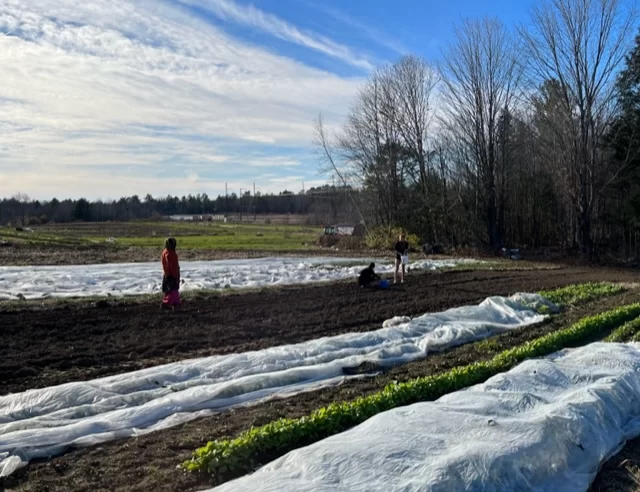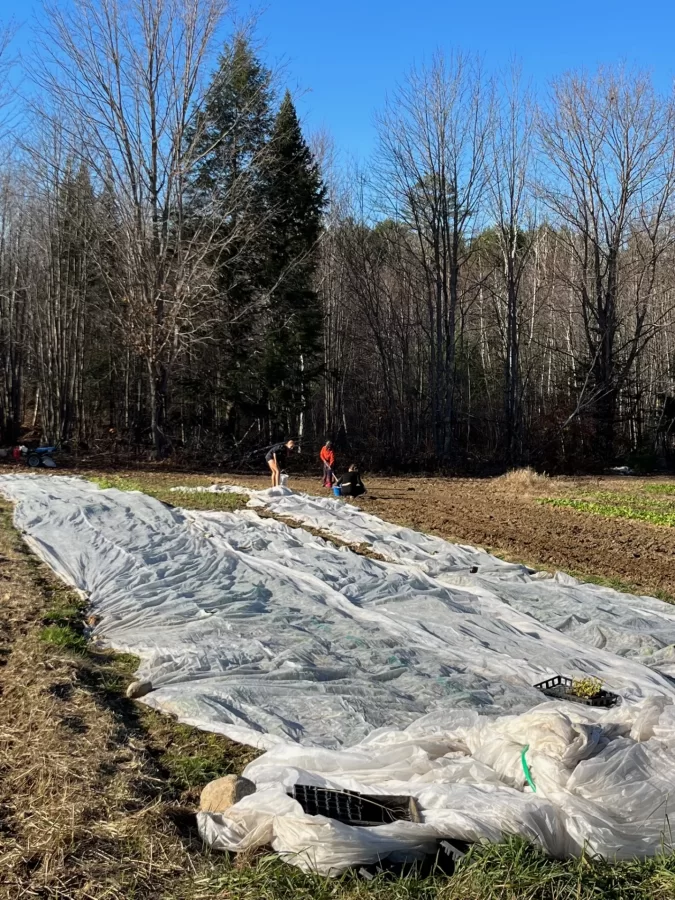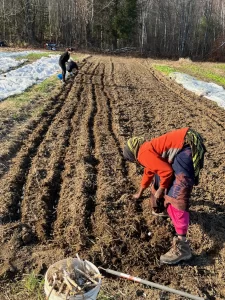A Bountiful Harvest
The first frost hit Lewiston on the last night of September this year. By then, farmers and gardeners had pulled in most of their crops and tucked them away in root cellars or cold storage. But as first-year Bates students Caroline Mayer and Kylie Musante learned recently on an unseasonably warm November day, there is already work to be done to ensure a bountiful harvest for next year.
Located just a few miles up College Street from Bates, New Roots Farm is a 30-acre farm that started under the cooperative ownership of four Somali Bantu farmers who came here in the early 2000s as refugees – Abril Abdi, Seynab Ali, Mohamed Abukar, and Batula Ismail. Each brought many years of experience and generations of agricultural know-how with them when they arrived in Maine, but they faced challenges in accessing farmland and adapting to a shorter growing season. As members of the first cohort in the New American Sustainable Agriculture Project offered by Cultivating Community, Abril, Seynab, Mohamed, and Batula learned how to adapt their skills to Maine’s climate. They also received training in how to market their produce to increase access to healthy local food in the community. With coordination from Batula’s son, Omar Hassan, who is the Cooperative Marketing and Development Assistant at the Cooperative Development Institute (CDI), the New Roots team sought out farmland close to their homes in Lewiston that would be suitable for a cooperative farming venture. In 2016, they identified a parcel of the former Gendron Dairy Farm on College Street, and worked with the Maine Farmland Trust to protect the land for farming while laying the groundwork for their eventual acquisition of the property. After leasing and working the land for five years, the New Roots Cooperative completed their purchase of the land in January of 2022.
Bates students like Caroline and Kylie have partnered with New Roots in multiple ways since they first began operating on College Street in 2016. Through thesis projects and coursework, students from Anthropology and Environmental Studies have worked on multiple projects with New Roots, exploring topics such as how to market farm-grown produce most effectively, or how to develop farm-to table ventures such as the Isuken Co-Op, a food truck that specializes in sambusas. Over the past two summers, student interns such as Isabelle Mueller ‘23 have combined weeding and vegetable cleaning with work to promote the farm over Instagram and Facebook (Isabelle’s reflections on her experiences are here).
When Caroline and Kylie first went to New Roots Farm, they worked with Batula to break apart heads of garlic and plant hundreds of cloves in the rows she had marked for next year’s crop. Neither of them had ever planted garlic before, but Batula gave them a quick demonstration and they went right to work. Both Caroline and Kylie commented about the joys of getting off campus and doing something with their hands. The work they did complemented what they were learning through their coursework about food systems and immigration, while also giving them real experience communicating across cultural and linguistic differences. As New Roots settles into their now permanent home up College Street from Bates, we look forward to many more mutually beneficial collaborations in the years to come.


